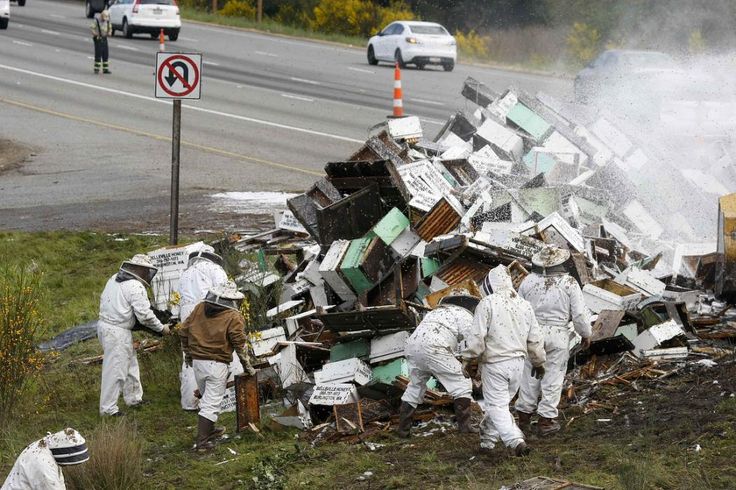On Wednesday morning, beekeeper Michael Barber was awakened by multiple police calls requesting his assistance.
The reason for their outreach was a mishap in Canada where five million bees had unexpectedly tumbled off a truck. The beehives, while being transported, had their securing straps become loose, resulting in their unplanned liberation.
According to Mr. Barber, upon his arrival, he was greeted by a rather chaotic swarm of agitated and disoriented bees, forming a remarkable cloud. The bees appeared to be upset, disoriented, and without a home.
Motorists were advised to keep their windows closed, while pedestrians were instructed to maintain a safe distance from the area.
he scene in Burlington, Ontario presented a scenario entirely novel to Mr. Barber throughout his 11-year career. Speaking to the BBC, he expressed, “It was an entirely different situation. I sincerely hope I do not have to encounter anything like it again.”
Mr. Barber, proprietor of Tri-City Bee Rescue located in the nearby Guelph area, recounted that his initial contact with local law enforcement occurred around 07:00 local time (12:00 GMT). The authorities informed him of an incident involving bee hives that had become scattered across the road due to an accident.
Concurrently, the police took to social media to issue a public advisory, urging individuals to refrain from venturing into the region. This location is situated approximately an hour to the south of Toronto.
The bees had been securely packed within their hives on the rear of a truck, undergoing transportation to their designated wintering site, when the unfortunate incident unfolded.
Promptly after receiving notification from the police, Mr. Barber initiated a request for assistance from fellow beekeepers. Ultimately, around twelve beekeepers lent their support to manage the situation with the bees.
As recounted by Mr. Barber, the bees and their hives were strewn across an area spanning a radius of 400 meters (1,300 feet). Certain younger bees were seen gathering on nearby cars and mail posts, an action he explained was indicative of their instinctual pursuit of safety.
“There were probably a thousand bees on the front of my truck,” he said.
Distrubed and more mature bees exhibited an agitated demeanor, creating a distinct buzzing presence in the vicinity.
Over the course of several hours, the majority of the bees managed to locate their respective hives, according to Mr. Barber. Unfortunately, a few hundred bees were unable to survive the repercussions of the accident.
Several beekeepers also fell victim to stings during the process.
The truck’s driver, not clad in a complete beekeeper suit, was stung over 100 times, as recounted by Mr. Barber. Fortunately, paramedics were in close proximity, and the driver’s injuries were not severe.
“There were a lot of flying bees that made even beekeepers in full suits nervous,” he said.
He expressed his gratitude for the numerous local beekeepers who collaborated to ensure the well-being of both the insects and the general public. He further emphasized that the occurrence serves as a valuable reminder to consistently fasten bee shipments securely.
“Lesson learned. Everybody survived and a few bees were hurt,” he said. “Hopefully the hives will survive the winter.“



